Principal’s Message
June 9, 2022
by Principal, Mr Steven O’Connor
The EREA Touchstones
St Patrick’s College is proudly a Catholic school in the Edmund Rice tradition. As a member of Edmund Rice Education Australia (EREA) we are informed by the Touchstones which are the bedrock or framework of all EREA schools.
As an EREA school, our Touchstones provide a direction for our work in educating young people in the charism of Blessed Edmund Rice. The Touchstones challenge us to continue to make the Gospel a living reality in our community. They call us to provide a liberating education, based on a Gospel spirituality, within an inclusive community committed to justice and solidarity.
As a Catholic school in the Edmund Rice tradition, we aspire to these four Touchstones:
Liberating Education:
We open hearts and minds through quality teaching and learning experiences, so that through critical reflection, discernment and engagement, each person is hope-filled and free to build a better world for all.
Gospel Spirituality:
We invite all people into the story of Jesus and strive to make his message of compassion, justice and peace a living reality within our community.
Inclusive Community:
Our community is accepting and welcoming, fostering right relationships and committed to the common good.
Justice and Solidarity:
We are committed to justice and peace for all, grounded in a spirituality of action and reflection that calls us to stand in solidarity with those who are marginalised and the Earth itself.
This week, the College is delighted to host a panel of educators from EREA and Catholic Education Ballarat as part of our EREA School Renewal. The panel has spent three days meeting and talking with students, staff, parents and other members of the broader community about how we go about embedding and enacting the Touchstones. Prior to this, students from Years 8-12 and staff were invited to participate in an online survey which provides the panel with relevant data as part of the process.
The review provides the panel and importantly, the College with some current and detailed feedback on work towards embedding and honouring the Touchstones. I thank all those who were involved in any element of the review and look forward to receiving the report from the panel in the weeks ahead.
Reconciliation Week
The College was delighted to launch its new Reconciliation Action Plan (RAP) as part of its Reconciliation Week activities recently. The week’s events included a Mass, smoking ceremony and dinner for our boarding community, the Reconciliation Assembly at which, a number of our indigenous students spoke, a RAP luncheon, a professional learning session for staff from the College and Catholic schools and agencies across the Diocese led by Dr Miriam Rose Ungunmerr-Baumann and our annual Tattee Shield football match.
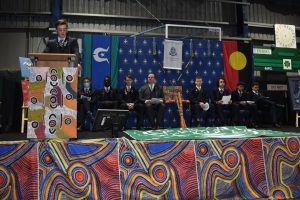
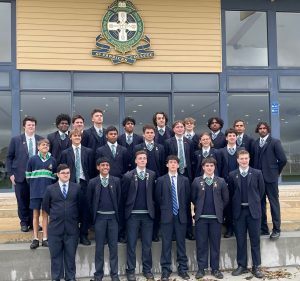
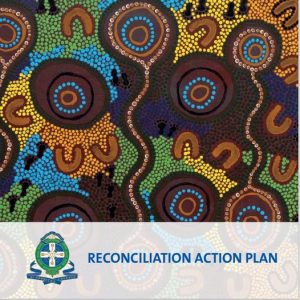
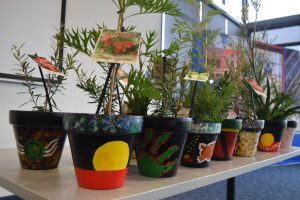
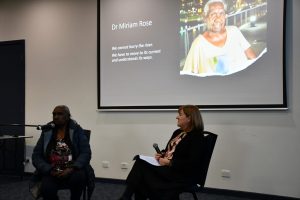
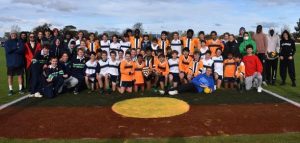
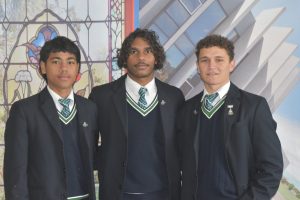
The significance of Reconciliation Week should not be missed by anyone in the St Patrick’s College community. We have had a strong commitment to Reconciliation and to providing a quality education to Aboriginal and Torres Strait Islander students. I acknowledge that we have not always got things right and amongst the many successes there has been difficult times and disappointment. The commitment to this remains steadfast.
I was honoured to be involved in the many consultations towards the renewal of our RAP in 2021. The people involved in the RAP Committee were passionate and committed and we met through thick during the many lockdowns last year. I acknowledge the tremendous work of Jason Napior in coordinating the RAP Committee last year. Thanks to the many people who were involved in this important process.
Please find a link to the College’s Reconciliation Plan. SPC Reconciliation Plan.
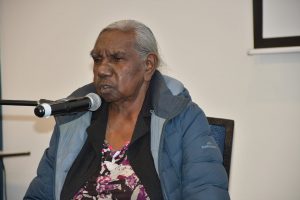 The College was honoured to host Dr Miriam-Rose Ungunmerr-Baumann AM as part of Catholic Education Ballarat’s Reconciliation Week events and gatherings. Miriam-Rose was Senior Australian of the Year in 2021 and is a highly respected artist, activist and spokesperson for Aboriginal Australia and Reconciliation. Recently, Miriam Rose has consulted with EREA on the development of its Learning Statement. I am delighted that Miriam-Rose was at the College and had the time to visit our boarding house and dine with our boarders following her presentation to staff on Wednesday afternoon.
The College was honoured to host Dr Miriam-Rose Ungunmerr-Baumann AM as part of Catholic Education Ballarat’s Reconciliation Week events and gatherings. Miriam-Rose was Senior Australian of the Year in 2021 and is a highly respected artist, activist and spokesperson for Aboriginal Australia and Reconciliation. Recently, Miriam Rose has consulted with EREA on the development of its Learning Statement. I am delighted that Miriam-Rose was at the College and had the time to visit our boarding house and dine with our boarders following her presentation to staff on Wednesday afternoon.
Miriam is the type of person with whom you could easily spend hours.
Below, Dr Miriam writes about Dadirri, the still awareness:
“Many Australians understand that Aboriginal people have a special respect for Nature. The identity we have with the land is sacred and unique. Many people are beginning to understand this more. Also there are many Australians who appreciate that Aboriginal people have a very strong sense of community. All persons matter. All of us belong. And there are many more Australians now, who understand that we are a people who celebrate together.
What I want to talk about is another special quality of my people. I believe it is the most important. It is our most unique gift. It is perhaps the greatest gift we can give to our fellow Australians. In our language this quality is called dadirri. It is inner, deep listening and quiet, still awareness. Dadirri recognises the deep spring that is inside us. We call on it and it calls to us. This is the gift that Australia is thirsting for. It is something like what you call “contemplation”.
When I experience dadirri, I am made whole again. I can sit on the riverbank or walk through the trees; even if someone close to me has passed away, I can find my peace in this silent awareness. There is no need of words. A big part of dadirri is listening. Through the years, we have listened to our stories. They are told and sung, over and over, as the seasons go by. Today we still gather around the campfires and together we hear the sacred stories. As we grow older, we ourselves become the storytellers. We pass on to the young ones all they must know. The stories and songs sink quietly into our minds and we hold them deep inside. In the ceremonies we celebrate the awareness of our lives as sacred. The contemplative way of dadirri spreads over our whole life. It renews us and brings us peace. It makes us feel whole again…
In our Aboriginal way, we learnt to listen from our earliest days. We could not live good and useful lives unless we listened. This was the normal way for us to learn – not by asking questions. We learnt by watching and listening, waiting and then acting. Our people have passed on this way of listening for over 40,000 years…
There is no need to reflect too much and to do a lot of thinking. It is just being aware. My people are not threatened by silence. They are completely at home in it. They have lived for thousands of years with Nature’s quietness. My people today, recognise and experience in this quietness, the great Life-Giving Spirit, the Father of us all. It is easy for me to experience God’s presence. When I am out hunting, when I am in the bush, among the trees, on a hill or by a billabong; these are the times when I can simply be in God’s presence. My people have been so aware of Nature. It is natural that we will feel close to the Creator. Dr Stanner, the anthropologist who did much of his work among the Daly River tribes, wrote this: “Aboriginal religion was probably one of the least material minded, and most life-minded of any of which we have knowledge.”
Miriam spoke about her love of going to Flat Rock; a place overlooking the Daly River. She indicated that this was certainly a place at which she could sit for hours, quietly and know and appreciate that she is in God’s presence.
I am sure that many of us have certain places, times or conditions that allow us to potentially experience a sense of Dadirri. I hope that this is the case and that we find the great nourishment of God’s presence and unconditional love in these settings and during these times.
St Patrick’s College Celebration Dinner
As many of you would be aware, we were unable to conduct our annual Celebration Dinner in either 2020 or 2021 because of the pandemic. I am looking forward to this major celebration which will be held on Saturday, 18 June at Ballarat Golf Club.
The Master of Ceremonies for the evening is well known television presenter, Gorgi Coghlan.
The Celebration Dinner is a really important event in the College calendar at which we recognise and honour members of the College community – Old Collegians, staff and/or members of the broader College community – who have made significant contributions via their careers and/or to the College.
The inductees at this year’s Celebration Dinner are:
Legend of the College: Detective Sergeant Kevin Carson (SPC 1970-73) will be inducted as a Legend of St Patrick’s College. For nearly 29 years Detective Sergeant Carson has investigated sexual offences committed against children that included a number of high-profile cases in the Ballarat area. He has worked tirelessly with victims and families to provide ongoing support and assistance. Detective Sergeant Carson has provided a dedicated service to Victoria Police, and to the community for over 46 years. Kevin has also been an incredibly notable figure in Ballarat sporting circles, particularly through his involvement as a football umpire.
Legend of the College: Michael Kearney (SPC 1962-67) will be inducted as a Legend of the College in recognition of his outstanding and unparalleled volunteer service to the St Patrick’s College community over five decades. Michael is the only person on record to have been both president of the OCA Committee and Chairman of the SPC Foundation. Through various decades he has also held all senior executive positions of the OCA – president, secretary and treasurer. Amazingly he was secretary of the OCA in 1976, some 45 years ago, and only stepped down from the committee last year. He has also been involved in the SPC Foundation for more than 30 years.
Young Achiever of the Year: Andrew Groch (SPC 2008-13) will be recognised as our Young Achiever of the Year in honour of his incredible work as one of Australia’s best young musical conductors and arts administrators. Despite being just 25 years old Andrew has already conducted the Adelaide Symphony Orchestra and has worked with the world-renowned London Philharmonic Orchestra before COVID forced a return to Australia. Andrew is currently working as a project officer with the Melbourne Symphony Orchestra.
Facere et Docere Award: Former Director of Boarding and Director of Community Development Mr Mark Waddington will be honoured with the staff award in recognition of his incredible achievements at the College between 2002 and 2011. In that time Mark helped rebuild the boarding community after it teetered on the brink of closure, oversaw major capital fundraising programs for projects such as the OCA Pavilion and the Jo Walter Field, managed the reintroduction of scholarship and bequest programs at the College and helped drive enrolment numbers to record levels. Mark was also instrumental in the rejuvenation of the College’s vaunted football program and ushered in a bright new era for the Old Collegians Association with a renewed focus on engagement and joy.
Facere et Docere Award: Dr Peter Casey was the First lay Headmaster or Principal of St Patrick’s College. During his tenure, enrolment numbers increased from 845 in 2002 to 1432 in 2015. Dr Casey over saw several major capital works projects rebuilding classrooms and facilities including the O’Malley Wing, the Wilding Wing, the restoration of the Chapel and the refurbishment of Kennedy House as the Administration Wing. Dr Casey also played a significant role in rejuvenating boarding and introduced the Indigenous Education program to St Pat’s. Dr Casey was honoured in the 2015 Australia Day Honours list for his “significant service to secondary education as an administrator and teacher, to professional organisations, and to the community of Ballarat.
Thank you for your on-going support of and interest in St Patrick’s.
Mr Steven O’Connor
Principal

